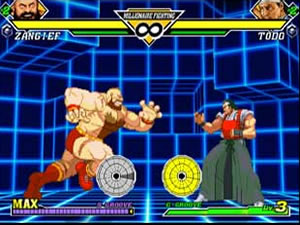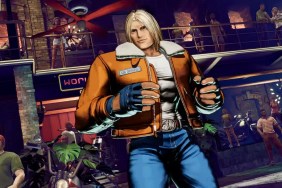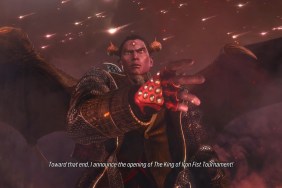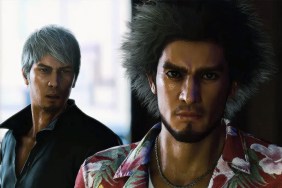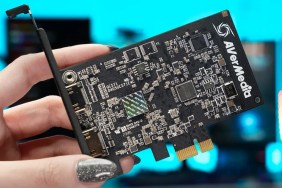Hadooooken-ism.
Last year Capcom released a solid 2D fighter for the PS2 in the form of Capcom
Vs. SNK 2. The plethora of characters, numerous ‘Grooves’ and cool point system
made it an easy recommendation for traditional 2D fighting fans.
However, Capcom’s first offering for the GC is less savory. Though it’s still
pretty decent, the ridiculous new GC-ism and awkward control scheme make this
feel more like sloppy seconds than a fully-realized product.
Capcom
vs. SNK 2 EO is inferior to other Capcom vs. SNK games in part due
to limitations involving the GC controller. As a reviewer I feel stuck, because
bashing this game seems like beating a child to show dissatisfaction with his
parents. But when it comes to dysfunction, just witness ‘GC-ism.’
The GC-ism mode makes the control scheme such that the L and R buttons are
the only punch and kick buttons. These buttons are pressure sensitive, thus
a hard tap will result in a hard punch/kick, while a light tap will result in
a light punch/kick. Simpletons will fall in love with this system because it
eradicates certain pesky weeds that have sucked the nutrients from Capcom gameplay
for too long: reliability and combos!
The dumbest part of the GC-ism mode is the mapping of each of the player’s
special moves to a direction on the yellow analog-stick. Simply pressing different
directions will result in the desired move, while the vigor with which you tap
will decide the strength of the move (i.e. tap left results in a light fireball,
while slamming the stick to the left will result in a fierce fire ball). Now
you can pull off insane moves like ducking and dragon punching, or walking forward
and executing a sonic kick in a split second. Character balance and strategy?
Who needs em!
Making matters even worse is the fact that the controls are set and cannot
be changed. You are also prevented from using the D-pad and must use the left-analog
stick for movement. Speaking of prevention, you cannot execute special
moves with the left analog stick and a button tap whatsoever; it’s not just
difficult, it’s functionally impossible. You are not allowed to execute a real
special move! Insane.
However, the gameplay in EO is fine as long as you stick to A-ism (Capcom
has gone insane with the -isms; this one means “arcade-ism”) and as long as
you aren’t too put off by the limitations of the GC controller. Even though
the controller has the smallest D-pad ever and an awkward button layout for
fighting games, I was still able to have fun putting the hurt on fools with
Evil Ryu.
The same six grooves that were present in the PS2 version are included in
EO with no variation. Three of the grooves are attributable to past Capcom
games like Street
Fighter Alpha 3 and Double
Impact, while three of the grooves belong to SNK games. While the three
SF grooves are pretty standard, the inclusion of three SNK grooves gives a relative
SNK rookie a lot of new ideas to poke around with, such as being able to pull
off unlimited super-moves once your health gets in the red! Shun goku satsu!
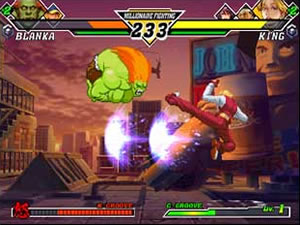 Visually,
Visually,
EO uses the 2.5D backgrounds that were fresh and exciting back in the
20th century, but were made obsolete by the environments in games like
DoA3. They’re simply an illusion meant to distract you from the fact that
nothing in EO is interactive other than the fighters.
However, the contrast between the backgrounds and the 2D fighters is less
noticeable than it was in the PS2 version. Not that the 2D, sprite-based characters
look impressive; they look exactly like they’ve looked since… 1994 or something?
How about some more complex models?
The characters are the same as those in Capcom vs. SNK 2, as are the
moves, appearances, etc. There still isn’t much to unlock in EO. While
there are a ton of special characters including Morrigan, Evil Ryu and dope-fiend
Iori, only three wait to be discovered (one of whom is Ultimate Rugal, and he
sucks).
Then again, unlocking the hidden characters is intuitively handled with a
system very similar to that of the World mode in SFA3. You basically
fight, try to kick ass in creative ways, rack up a bunch of points, and hope
one of the hidden bosses challenges you at the end of the game.
The endings are limited to only a few possible outcomes. However, the integration
of a possible boss fight within the endings adds some tension, as well as some
length once the super boss has actually been vanquished.
EO also comes with a color editing feature that allows you to tweak
just about every aspect of every fighter’s shading and an unlockable Groove
editing feature in which you can create new Grooves based on your preferences
(although if you prefer invulnerability and Spider-speed, you’ll be sorely disappointed).
If you’re familiar with the PS2 version, this should already be familiar to
you.
EO‘s sound is fine, with a genuinely entertaining, cheesy announcer
guy and some cool battle tracks. Except that I’ve heard everything before, verbatim,
from Capcom vs. SNK 2. How about a cheesy announcer girl next time?
Capcom Vs. SNK 2 EO is largely identical to Capcom Vs. SNK 2,
and therefore is largely a decent offering. However, the fact that so little
has changed combined with the weak GC-ism either suggests that Capcom thinks
GC owners are mental invalids, or that Capcom doesn’t think much about GC owners
at all.
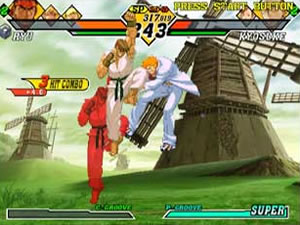
-
It's
-
Tons of choices
-
Good audio
-
Rehash
-
Feels old
-
'GC-ism' is the work of psychotics
